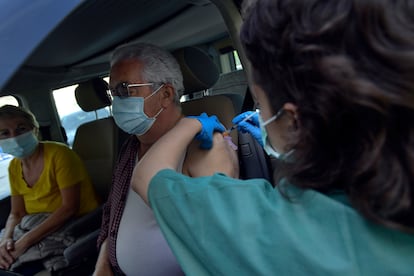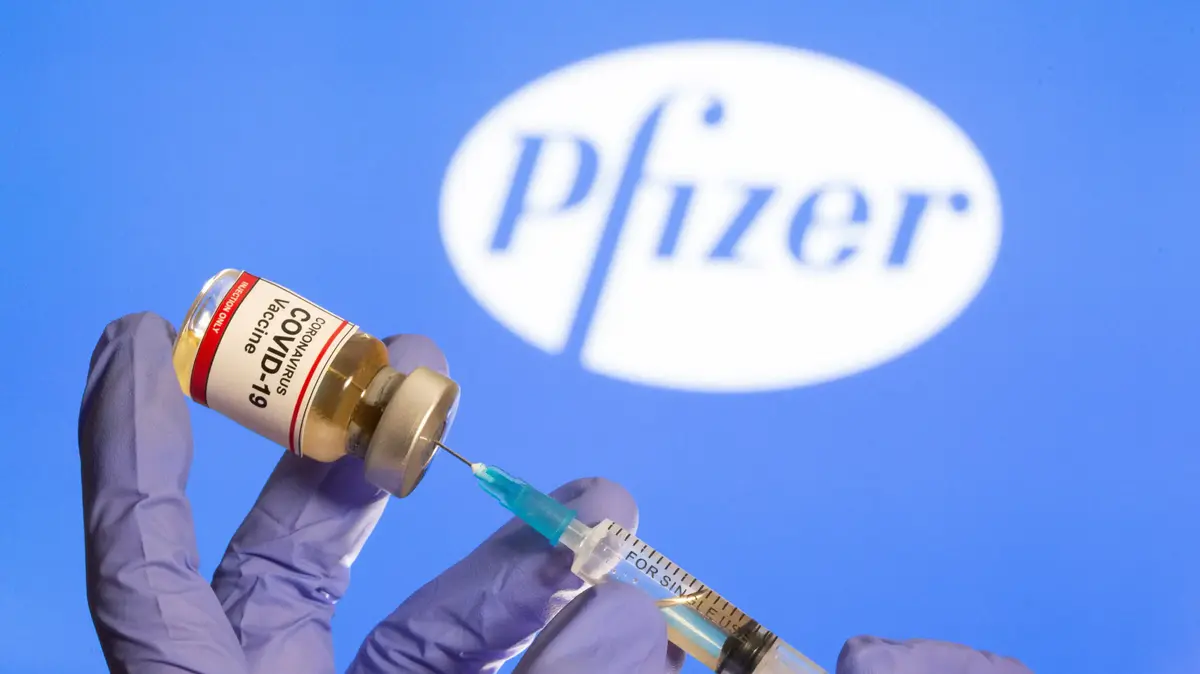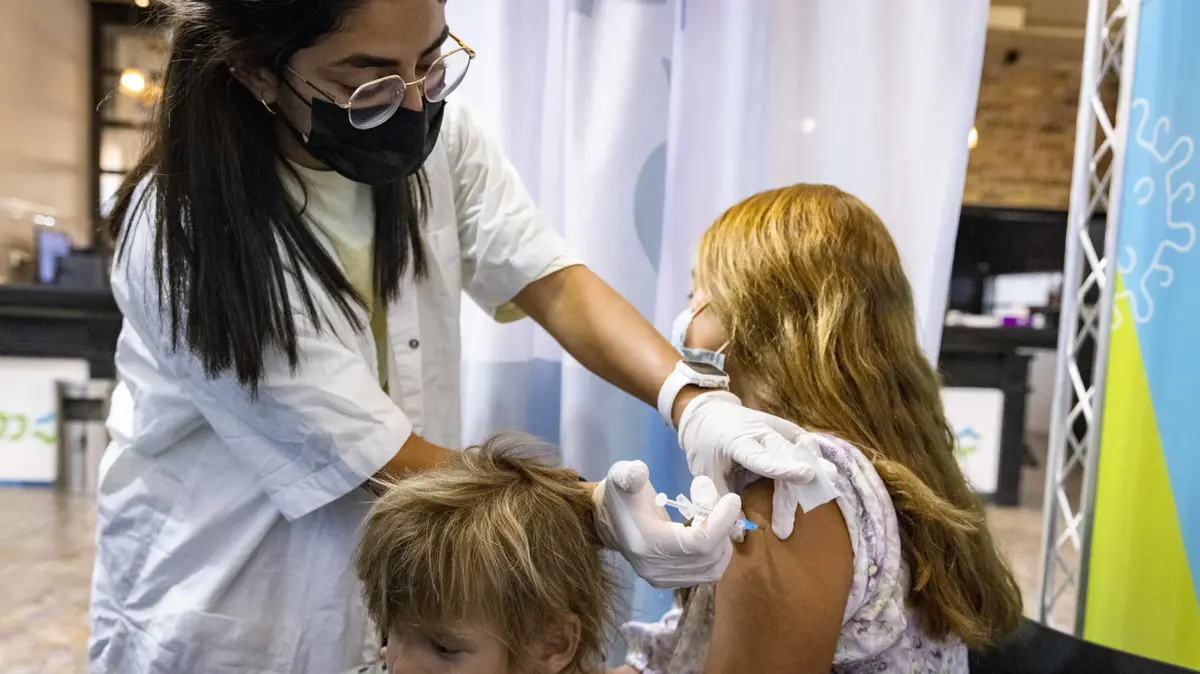Washington's sudden turn in favor of the release of patents for covid-19 vaccines has left Europe and Germany, in particular, as the main bastion against a measure that has been demanded for months by more than 50 countries in the process. development, with India and South Africa at the fore. Brussels has reluctantly agreed to study US President Joe Biden's proposal when he makes it official. But in the community capital a general suspension of patents is practically ruled out, among other things, because they do not want to provide competitors such as China or Russia with such revolutionary technology as that which German and American pharmaceutical companies have managed to develop for new vaccines. generation.
"We do not believe that in the short term it is the magic solution, but we are prepared to discuss it when there is a concrete proposal on the table", said this Saturday the President of the European Council, Charles Michel, after the first day of the European summit that took place. held in Porto (Portugal), in relation to the release of patents.
More information
The EU asks Biden to finalize his proposal to release patents for covid vaccines
The 27 thus second the line marked by the president of the European Commission, Ursula von der Leyen, who was also ready last Thursday to pick up the glove thrown by Biden, but urged the US to authorize exports of vaccines and health products to immediately alleviate the situation of the most desperate countries. And although different positions coexist in the EU, with countries like Spain or Ireland openly in favor of suspending patents, the dominant line is that marked by the German Chancellor, Angela Merkel, who has categorically rejected the idea. "The protection of intellectual property is a source of innovation and should continue to be so in the future", has settled Merkel,that has come out in defense of some German laboratories that have achieved with the vaccine a potentially revolutionary leap in the history of medicine.
The race for vaccines against covid-19 has given the European Union and the United States a great scientific victory against their main geostrategic rivals, in particular, against China. The generation of messenger RNA (mRNA) vaccines, developed by the German pharmaceutical companies BioNTech and CureVac and the American companies Pfizer and Moderna, represent a technological leap with the potential to transform the treatments of numerous diseases over several decades.
This tremendous advance, according to the community sources consulted, makes it very unlikely that the Western bloc will share knowledge that almost no country in the world, except China, could exploit on its own. Community sources doubt that Biden's proposal, yet to be finalized, includes this technology and could be limited to proposing the release of patents for traditional vaccines (the so-called adenovirus) such as AstraZeneca and Janssen.
"Let's not kid ourselves, but, with all due respect, the patents are not going to be exploited by Bolivia or Cameroon, but by one of our big competitors," says a diplomatic source.
The EU is aware that mRNA technology is revolutionary for the pharmaceutical sector and that all the major laboratories in the world are waiting for how to get on a train that, at the moment, only control a handful of companies, all of them, except the centennial Pfizer, tiny for the industry and born in the last 20 years.
Benefits for pharmaceutical companies
The financial dividend has been immediate.
Pfizer, which presented its results for the first quarter of the year this week, has tripled the turnover of its vaccines division (to 4,000 million euros) and has revised upwards its revenue forecasts for this year by 17%.
BioNTech, which presents results on Monday, has already multiplied its revenues by 12 in the last quarter of 2021 compared to 2019. And it forecast vaccine sales worth 9.8 billion euros for this year, a figure that seems set to increase .
Vaccination with doses of Pfizer in Pamplona this Friday.
Alvaro Barrientos / AP
Nothing foreshadowed that result when governments in Europe and the rest of the world began last year to manage the portfolio of potential vaccines. The safest bet seemed then that of traditional drugs, such as that developed by the British University of Oxford and manufactured by AstraZeneca or that of the American Johnson & Johnson. The same line of research followed the vaccines developed by Russia and China.
Still, the Commission included three mRNA vaccines - those from BioNTech-Pfizer, Moderna, and CureVac - in the portfolio of six it selected from dozens of research projects already underway last year. "From the beginning we invested in a promising but completely new technology, such as mRNA, and in the creativity of scientists such as Ugur Sahin and Ozlem Türeci," recalled the President of the European Commission, Ursula von der Leyen, referring to the German founders of BioNTech
The Commission has reserved a total of 2,600 million doses, with 1,465 million of the latest generation. Against all odds, Brussels hit the mark in favor of mRNA, a technology that had been developed for decades to try to cure certain diseases or prevent infections but which was not guaranteed to be useful against the coronavirus.
The blazing success of BioNTech-Pfizer and Moderna, to which CureVac could soon join if it receives authorization from the European Medicines Agency, has complicated the debate on a possible temporary suspension of patents within the framework of the World Trade Organization ( WTO). "Europe should not hinder efforts to expand global vaccine production," says Zain Rizvi, a researcher at Public Citizen, an American organization specializing in citizens' rights, which has been battling for months to liberalize patents. "Brussels works for the citizens, not for big pharma," adds Rizvi.
The demand for the suspension of patents has become an outcry due to the huge difference in the rate of vaccination between developed countries and the rest of the planet.
In the United States, 30.6% of the population is fully vaccinated;
in the United Kingdom, 24%;
and in the EU, 12%.
However, in South Africa the figure remains at 0.6%;
and India, at 2.3%.
In Europe, more than three million people are vaccinated a day, while a country like Niger (24 million inhabitants) has received 1,366 doses since the start of the vaccination campaign.
Vaccination in Rome at the end of April.
FABIO FRUSTACI / EFE
The EU already assumes that the debate is inevitable, but it will come to the negotiation in Geneva (WTO headquarters) convinced that it is largely a smokescreen that hides the lack of solidarity from the United States or the United Kingdom, that do not export vaccines, and behind which lurks the interest of some countries or companies to acquire a precious intellectual property.
Even so, community sources admit that pharmaceutical companies will have to make gestures to meet the urgent demand for vaccines, especially in countries with fewer resources.
These sources point out that the dramatic experience of AIDS treatments plays against the sector "when it took an unacceptably long time to allow access at affordable prices to the poor countries hardest hit by the virus."
Brussels believes that the painful footprint of AIDS may lead some countries to take advantage of the debate on covid-19 to propose a total revision of the WTO rules in relation to the health sector, dating from the Uruguay Round ( 1986-1994), although they were somewhat relaxed in the Doha round (started in 2001 and not yet fully concluded). "The current rules are not made for a pandemic," say Doctors Without Borders, an organization that asks WTO members to resist suspending patents (the EU, United Kingdom, Switzerland, Canada, Australia, Norway, Japan and Brazil) that support the proposal of India and South Africa.
The long duration of possible WTO negotiations augurs, according to Brussels, an endless saga around patents with little short-term results.
The EU insists that the most urgent thing is for the US to lift the ban on the export of components that has left countries such as India, Brazil or Argentina without production capacity.
An opinion shared by some experts.
“What if the United States simply removed restrictions on the export of major manufacturing inputs that companies like the Serum Institute [Indian biotech and drug maker] need to keep producing vaccines?
That would probably have a more immediate effect, ”says Kristopher Howard, international vaccine production consultant for NRL Enterprise Solutions.
The Union acquires another 1,800 million doses
The EU, meanwhile, continues to buy doses.
Von der Leyen announced this Saturday that it has closed another contract with Pfizer-BioNTech for the supply of 900 million doses with an option to purchase another 900 million.
In total, 1,800 million to be dispatched between 2021 and 2023, in addition to the 2,600 million reserved previously.
The president of the Commission has attributed the need for such a massive purchase to three reasons.
“Sooner or later we will have to vaccinate adolescents and children;
Booster doses will probably need to be injected when we know the duration of immunity the vaccine gives;
and there is the question of the possibility of worrisome variants, "said Von der Leyen.
Faced with possible criticism for hoarding a sufficient number of doses to vaccinate the 405 million inhabitants of the EU several times, the president has indicated that "the contracts include the possibility of exporting or donating" the doses that are considered convenient.
Brussels defends precisely that in order to accelerate the immunization of the planet (some 11,000 million doses are needed to reach 70% of the world's population) it is necessary to add other debates to the negotiation on patents, such as the promotion of licensing , so that more laboratories can be incorporated into production, technology transfer, training of specialized personnel and investments in manufacturing capacity beyond the territory of each country.
Commission sources warn, however, that even this route, which they consider much faster than the suspension of patents, will require time to produce results. These sources estimate that the adaptation of a laboratory to be able to manufacture the vaccines requires between six and 12 months. And the training of the necessary personnel for another six months.









